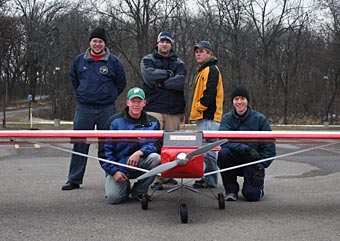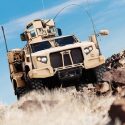UW research taking a birds-eye view of groundwater discharge
Water research is often carried out in waders, but this year University of Wisconsin–Madison hydrogeologist Steven Loheide will use an unmanned aerial vehicle (UAV) to probe water locked underground in a study supported by the UW–Madison Water Resources Institute (WRI).

For their mechanical engineering senior design project, undergraduates Troy Reabe, Scott Plosczynski (green hat), Ryan Clements, Mike Wall and Dave Galarowicz built an unmanned plane for specialized aerial imaging. The craft is currently in use by the UW–Madison Water Resources Institute.
With a wingspan of 16 feet and a payload of 20 pounds, the aircraft isn’t the typical hobbyist’s remote-controlled toy. It was modified and built in six weeks by five UW–Madison mechanical engineering students as their senior project.
The plane was designed to fly a selected route on autopilot while snapping thermal infrared photos of the terrain below. These low elevation photos provide much more detail than satellite imagery at a significantly lower cost than sending a piloted plane to do the same job. The thermal photos will help map areas where cold groundwater springs enter surface streams, an important first step toward implementing the state’s new groundwater protection law, 2003 Wisconsin Act 310.
Besides airborne research of groundwater discharge, this year’s WRI projects address a number of other critical issues relating to groundwater quantity and quality, including:
- Predicting the path of septic system effluents so that property owners can avoid drilling wells in the path of contaminants;
- Examining outcrops and quarries in Marinette, Oconto, and Shawano counties to learn more about potential sources of arsenic and other metals of concern in groundwater;
- Researching groundwater levels of nitrite, high concentrations of which can make drinking water unsafe.
One of 54 Water Resources Research Institutes nationwide, the UW–Madison WRI annually supports about a dozen research projects related to drinking water, groundwater and surface water. Research supported by WRI currently involves more than 50 faculty, staff and students from UW campuses in Green Bay, Madison, Milwaukee and Stevens Point; researchers from the U.S. Geological Survey; and individuals from the private sector.
Tags: engineering, learning, research


